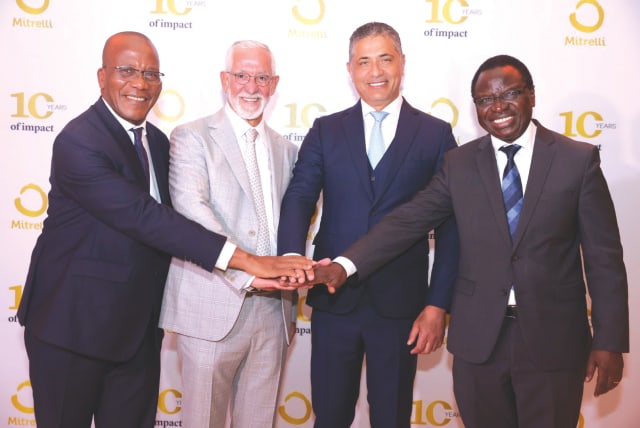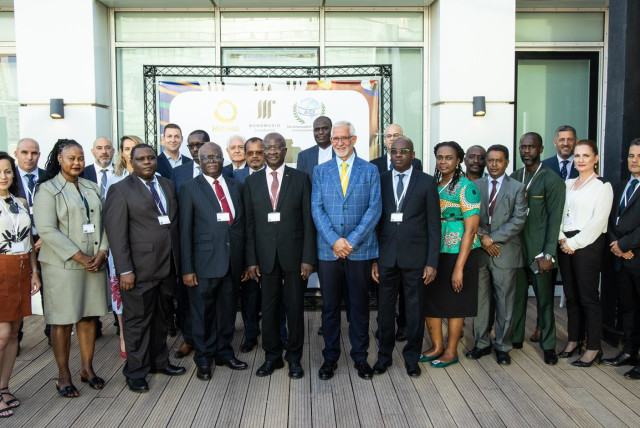How Israeli innovation could power Africa’s future

ENVIRONMENTAL AFFAIRS: Mitrelli, which has been operating in Africa for 10 years, celebrated its anniversary with at the Museum of Tolerance Jerusalem.
By 2050, a quarter of the world’s population will be African, demanding the continent become more prosperous and sustainable. Tiny Israel, with a population of only nine million people, could be part of Africa’s solution – at least according to some experts.
“Leaders in Africa and Israel can join forces for a global impact,” said Haim Taib, founder and president of Mitrelli Group.
Mitrelli Group “is the fusion of multinational leadership and teams and an important bridge for Africa,” he told a group of 1,000 guests on Tuesday night in Jerusalem. “Investment in education and local talent will enable the next generation to grow the local economy, create new jobs and establish the next technology companies in Africa.
“In the next decade, we will provide vocational and technical training to one million people on the continent. Together, with the Israeli tech ecosystem, we can develop innovative solutions.”
MITRELLI GROUP has been operating in Africa for 10 years. On Tuesday, it celebrated its anniversary with a thousand guests at the Museum of Tolerance Jerusalem, including 500 of the group’s employees from Angola, Côte d’Ivoire, Senegal, Switzerland and Israel, among other places.
The delegation also included senior African figures such as Dr. Serigne Gueye Diop, minister and adviser to the president of Senegal for agriculture and industry; João Baptista Borges, minister of energy and water from Angola; and Dr. Vaflahi Meite, director-general of economic diplomacy, Ministry of Foreign Affairs, Regional Integration and Diaspora, from the Republic of Côte d’Ivoire.
Aside from African cocktails and cuisine – served on dishes the color of sunburned earth, amid decorations reminiscent of Africa’s verdant rainforests – on the menu was strengthening Israeli-African relations in innovation, food, agriculture, water and energy.
More than 80% of Mitrelli’s 2,500 employees operate in Africa. Over the last decade, the organization has been responsible for giving access to potable water and electricity to nearly half a million people and access to healthcare, education and training projects to hundreds of thousands of others.
Now, Mitrelli is looking toward the next 10 years, when Africa will be home to over 50% of the world’s young population under age 15, said Yaron Tchwella, CEO of Mitrelli Group. For example, in the Republic of Cote d’Ivoire (the Ivory Coast), 70% of the population is already under 35, explained Meite.
“We have to create about eight million jobs over the next 10 years, and that is not easy,” he told The Jerusalem Post.
“Creating jobs should not come from the state, but the private sector. So, the challenge is to develop the private sector in such a way that they can create jobs for our youth. That is why we are looking at how to transform our industries.”
Ivory Coast is already working with Mitrelli to improve what Meite called its mangoes sector. Most local fruits are seasonal, with harvest times only three to four months a year. The country cannot store and maintain the fruits during the rest of the year, limiting their availability on the market. Mitrelli is assisting the country in changing that.
It is also working on projects to promote worldwide awareness of the quality of the country’s mangoes, pineapples and avocados, so it can export them to more countries.
Israeli innovation in the African continent
“We have to take advantage of Israeli advances in agriculture,” Meite said. “We know that Israel was a desert only 75 years ago, and today it is green.... Cote d’Ivoire is also arid, and we can benefit from learning from Israel.”
Senegal is eyeing Israeli technology for similar efforts. The COVID-19 pandemic increased food insecurity in Senegal, leaving 20% of the population undernourished, according to the United Nations. Today, Diop said, Senegal is looking to revolutionize its agriculture industry.
“Israeli innovation in agritech and foodtech has an important role in addressing the world’s needs,” he told the Post. “We must develop new technologies that improve food processing, preservation and distribution. I am confident that, with the support of our president and government, and with Mitrelli Group and innovative Israeli technology, we can overcome the challenges we face and build a world where everyone has access to food, education and innovation.”
Mitrelli is working with Senegal now to build a network of 23 schools, including programs focused on technology, innovation and vocational training. Moreover, they are working on final approvals for a biogas program.
Biogas is a naturally occurring and renewable energy source from animal and plant waste. It can be used for cooking and other applications, and, at the same time, its byproduct can be used as a fertilizer.
“Israel is helping us build this biogas program in remote areas, which could have a strong effect on deforestation,” Diop said. “Today, where we don’t have gas, we are using wood from trees to make energy, which has a negative effect.”
Senegal is an active member of the UN’s efforts to reduce greenhouse gas emissions “to make the world greener. We plan to be a leader in Africa on biogas and reducing emissions, with Israel’s help.”
He said a pilot project should launch by the beginning of 2025 in Sandiara, where he also serves as mayor. Then, if successful, it will spread to other cities.
“I strongly believe that only with innovation and advanced technologies we will be able to face Africa’s challenges and support food independence, not only for Africa but worldwide,” Diop said.
When Meite was asked how he reconciles working so closely with the Jewish state when some African states are actively trying to withdraw the accreditation of Israel as an observer at the African Union and have condemned Israel for the Palestinian-Israel conflict, he said he does not let it influence his policies.
“Overseas, people see Africa as a country, but we are a continent of 53 states with different laws and approaches,” Meite stressed, adding that there were times that, “because of politics, we had to take a bit of distance. But now we have no reason not to [work with Israel], so we must do it.”
“We feel the impact of our projects in Angola, said Otheniel Mascimenento, human resources manager for Mitrelli in Angola, who was also at the event. He said the group is touching the lives of thousands of people, giving them water, shelter and access to improved healthcare.
“Lots of people are doing projects in Africa similar to us, but our capacity to stick with a project for the long term is where the company is making the biggest difference.”
Introducing the Mitrelli Impact Prize
Taib announced “The Mitrelli Impact Prize” on Tuesday, a $100,000 annual grant awarded to an individual or team that introduces innovative initiatives aimed at creating employment opportunities in tech, health and education in Africa.
Taib’s family are African immigrants. His parents moved to Israel from Tunisia in northern Africa in 1947 and 1952, respectively. Thirty years ago, he returned to Africa for the first time, and since then, he has wanted to help the continent.
“For me, it is closing the circle,” he told the Post.
But he recognizes it is up to the people of Africa to take and use the gifts that Mitrelli is giving, whether it be training a million hi-tech engineers in the next 10 years or working with elderly community leaders to open their minds to their children doing work differently than it was done before.
“What I am trying to do is create a generation of young people for whom school and a profession matter,” Taib said. “Then, all of Africa will leap forward.
“The name of the game is all about people,” he said. “The 500 people we brought from Africa are making the change in Africa.... We bring the idea, technology and money. But, in the end, the people are making the change.”
The Environment and Climate Change portal is produced in cooperation with the Goldman Sonnenfeldt School of Sustainability and Climate Change at Ben-Gurion University of the Negev. The Jerusalem Post maintains all editorial decisions related to the content.
Jerusalem Post Store
`; document.getElementById("linkPremium").innerHTML = cont; var divWithLink = document.getElementById("premium-link"); if (divWithLink !== null && divWithLink !== 'undefined') { divWithLink.style.border = "solid 1px #cb0f3e"; divWithLink.style.textAlign = "center"; divWithLink.style.marginBottom = "15px"; divWithLink.style.marginTop = "15px"; divWithLink.style.width = "100%"; divWithLink.style.backgroundColor = "#122952"; divWithLink.style.color = "#ffffff"; divWithLink.style.lineHeight = "1.5"; } } (function (v, i) { });

